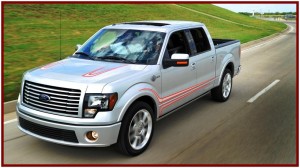In an unusual announcement out of Dearborn this morning, Ford Motor Company said that it has signed a memorandum of understanding (MOU) with arch-rival Toyota Motor Corporation on the development of a new hybrid system for light truck and SUV customers.
Both companies of course are heavily invested in fuel thirsty larger trucks, with Ford’s best selling vehicle the F-Series pickup rated at 16 mpg on the EPA city test cycle. The F-Series has been the U.S.’s best selling truck for the past 34 years with year-to-date sales of 313,000 units. Toyota before the Great Recession invested billions in full-size trucks and SUVs. Both the Tundra pickup and Sequoia full-size SUV have been sales disasters.
In a release Ford said that both companies have been working independently on their own future-generation rear-wheel drive hybrid systems. Ford and Toyota will now collaborate as “equal partners” on a new hybrid system for light trucks and SUVs. General Motors of course has been offering a hybrid system on its larger pickup trucks and SUVs for years now – with little to no consumer acceptance.
Ford and Toyota said that their collaboration will allow them to bring these hybrid technologies to customers sooner and more affordably than either company could have accomplished alone.

"By sharing our know-how and experience, we would like to offer even better telematics services in the future
“In 1997, we launched the first-generation Prius, the world’s first mass-produced gasoline-electric hybrid. Since then, we have sold about 3.3 million hybrid vehicles,” said Takeshi Uchiyamada, Toyota executive vice president, Research & Development.
According to the MOU, the two companies will bring their independently developed hybrid powertrain technology and knowledge to a new co-developed hybrid system, which will be used in rear-wheel-drive light trucks arriving later this decade.
The rear-wheel-drive hybrid system will share “significant common technology and components.” Ford and Toyota will integrate the system into their own vehicles. Each company also will determine the calibration and performance dynamics characteristics of their respective light pickups and SUVs.
The latest issue of Consumer Reports shows the expensive, optional EcoBoost twin-turbocharged V6 engine in the Ford F-Series pickup truck gets the same 15 mpg fuel economy as the 360 horsepower V8 in CR’s road test. CR reported 10 mpg city, 22 highway for both engines.
Worse, the F-Series V8 gas tank holds 10 gallons more than the V6’s giving it a distinct advantage in range. Ford engineers likely made this negative trade-off since they were wrestling with the weight that a complex dual turbocharging and direct injection adds, which could have sent the EcoBoost into a higher EPA test weight class, thereby decreasing economy ratings and making apples-to-apples comparisons even worse against the other less expensive Ford engines.
Owners might not be as amused as we are, given this elaborate gaming of the EPA system by Ford – especially if owners get similar results after paying at least another $1750 compared to the base V6, or $750 more than the V8 option.
Ford and Toyota also agreed to work together on “enablers” to complement each company’s existing telematics platform standards, helping bring more Internet-based services to consumers globally. Recently, Ford customer satisfaction has plummeted because of owner complaints about a badly designed “Sync” telematics system. Toyota, behind in telematics just introduced its Entune system.


